- Home
- Jennifer Niven
Velva Jean Learns to Fly Page 8
Velva Jean Learns to Fly Read online
Page 8
~ 1942 ~
Forward to battle go . . .
Vict’ry is ours we know . . .
—“Forward to Battle”
NINE
On May 21, I was collecting empty cans of Hunt’s tomato sauce, Dole pineapple juice, and Chicken of the Sea fancy tuna and stacking them on the counter in the café. The Arcade had turned into a collection depot for tin cans—tops and bottoms with paper labels cut off, washed and flattened. The cans were picked up weekly and carted to the loading docks of trucking companies, and from there they were sent to Colorado to a central depot. The president said we needed to save all our tin and metal so that we could build airplanes and make bullets.
I was trying to imagine one of these cans all the way in Colorado, when Gossie came in from work and sat down at the counter. She used the big toe of each foot to push the shoe off the other. She said, “I’m sick of selling handbags.” While the customers watched, she pulled off her nylons and said, “I’m doing my part. I’m donating my stockings. I’m tired of wearing them. I’m never going to wear them again.” The government needed nylons for making medical supplies, parachutes, powder bags for artillery pieces, and tow ropes for gliders. “Do you think they can use them even if they’re runny?”
I said, “I don’t see why not.” I couldn’t stop thinking about all the sacrificing we were doing and about women everywhere working and fighting for freedom, like Carole Lombard who was killed on January 16 when her plane crashed into a Nevada mountainside. She had been flying back to California from Indiana, where she was selling war bonds at a rally. There were twenty-two people on board the plane, including Carole Lombard and her mama, and every single one of them died instantly.
I was starting to feel worn down by the war, by people dying, by Nashville, by my life dreams. I’d been to every recording studio in town more times than I could count. I’d started writing letters to Judge Hay at the Opry—a letter a week—hoping he might want to audition me, but I hadn’t heard a word from him. I’d been to one opera and a Sacred Harp singing and a bluegrass show and I even went to the colored church on the edge of town, way out past the airport, to hear the gospel music. I was trying to educate myself, just like Darlon C. Reynolds said, and that also meant going to the Opry whenever I could.
The truth was, no matter how many kinds of music I listened to or how many times I left my name at studios, no one wanted me. Ever since February I’d been working on a good case of the blues. I hate the blues because they aren’t like the measles—you don’t just have them once and then you’re done with them forever. Daddy Hoyt said he’d had them so many times in his life that he thought he must have worn them out, when there they would come back all dressed up, fresher than ever, to throw him down, choke him, and dare him to tell it. I’ve always wondered where they come from and where they go off to once they leave you.
Right now I had the kind he called the Gentle and Wholesome Blues—not the type, like the Mean Devil Blues, that made you kick the door or break someone’s window. The Gentle ones were quieter, but they were just about the worst kind because they sat around you and on you and in you, just like a headache or a bad winter cold, and wouldn’t leave you alone.
After I stacked the cans, I soaped down the counters and rubbed at a stubborn bit of food and then wiped them clean. I could feel those blues gathering right over my head. I could feel my mind growing dark as a thundercloud.
Gossie said, “What’s wrong with you, Mary Lou? I’ve never seen you look so blue.” She laughed. “Hey, look at me writing a song. You should turn that into something.”
I said, “Maybe,” which meant I wouldn’t. Ever since Pearl Harbor, my songs had been drying up. After I was done with work for the day, I sat down at my typewriter, and I just stared at the blank sheet of paper. Sometimes I typed a few words, but none of them made sense. They felt outside me, like I was standing far away from myself and trying to write instead of writing from the inside.
Lately I’d been thinking I might just give up music for a while and sign up to be a WAAC. To be a WAAC you had to be between twenty-one and forty-five, at least five feet tall, and weigh at least one hundred pounds. The girls who joined up worked as file clerks, radio operators and repairers, sheet-metal workers, typists, control-tower operators, weather observers, and bombsight maintenance specialists.
Gossie said, “You and the girls should sing something. Sing something right now. That always makes you feel better.”
I said, “Maybe. I’m going to take these plates back to Crow.” I picked them up and walked into the kitchen. As I did, the bells on the door jangled, which meant someone came in or went out.
Crow was frying chicken, his face red and wet from the heat. He said, “What do you know, Velva Jean?”
I said, “Not much.” I dropped the dishes one by one into the soapy water of the sink and watched the bubbles rise up to the surface, just like the dishes were taking in one last breath. There was a kind of hazy film on the top of the water, and I could see part of myself in it—a blur of lips and one eye and curling hair. I looked up at Crow and watched him wipe his face. He shook the chicken in the fryer and hummed to himself. I tried to picture him on stage at the Opry. I thought, There I’ll be, twenty years from now, just like Crow, frying up chicken right here at the Lovelorn.
Marvina burst in from the café and said, “Lordy, you should see what just rolled in. Tom Buccaneer in the flesh.” She grabbed her handbag from the cubby where we stored things and flipped open her compact. She took out her tube of lipstick and painted her mouth even though it didn’t need it.
She went out and Gossie came in then, wading in her bare feet. Crow said, “You better have shoes on, Gossie. This is a place of business. This is a restaurant, for God’s sake.”
She didn’t pay him one bit of attention. She said, “Mary Lou, you better get on out here. I’ve got a surprise for you.”
I said, “I’m busy.” I swished the dishes around in the sink. My reflection went away. All I wanted was to be left alone for even a minute or two.
Gossie grabbed my arm and started pulling me, and so I kind of half walked and was half carried out of the kitchen, my hands dripping water all over the floor. There was Marvina standing just behind the counter, looking back and forth between me and this tall man that was standing on the other side, bag slung over one wide shoulder, skin the color of gold dust, hair cut short like a soldier. Marvina had a wild grin on her face and her head was just whipping around on her neck. Now big old Tommie Lou was lining up, smiling like a fool. She was herself again, good as new. You never would have known she’d been bit by a mad dog.
Gossie pushed me forward, and the man said, “Great holy Moses, girl. I hardly even know you.” And then he whistled long and loud.
My hands went clammy and my heart jumped right up into my throat and I ran up and threw my arms around him so tight I could hear him trying to get his breath.
“Velva Jean, you’re going to strangle me.”
I said, “I hope so. I hope I do.” It was too impossible and wonderful to believe. I couldn’t let go of him. Somehow he got out of my grip and dropped his bag and picked me up and swung me round and then he hugged me tight. I was crying by then, even though everyone in the Lovelorn Café was staring. I said, “Johnny Clay Hart, where in the Sam Hill have you been?”
Johnny Clay had been everywhere, up and down the country, heading west. Gossie took over my shift, waiting on tables in her bare feet, while he and I went out onto the Nashville streets and walked and walked and walked. He’d grown about three inches since last summer and he looked as pleased with himself as I’d ever seen him. Every girl we walked by turned to look at him and I thought, Heaven help us all.
He said, “How many records you made, girl?”
I said, “None yet.” I didn’t tell him that nobody would hear me sing except for Darlon C. Reynolds, and now he would probably never want to hear me again after the audition I gave him.
Before Johnny Clay could ask me why I hadn’t made it yet or what exactly I’d been doing with myself since I’d been in Nashville, I said, “Start with when you left Fair Mountain. I want to know everywhere you been and what you been doing.” I wondered if this would make him think about Lucinda Sink and the man that tried to hurt her, the one he nearly killed, which was why he had to run away in the first place. If it did, he didn’t let on.
He winked at some girl going past in too-high heels and too-bright lipstick. She was staring at him so hard she walked into a streetlamp.
He said, “I jumped the train out of Alluvial and just rode. I rode till I got to South Carolina and then I jumped another train to Georgia, another one to Alabama, and then another to Mississippi. I bummed a ride down to Gulfport and then another to New Orleans, where I tried to look up Butch Dawkins.” Butch Dawkins was Johnny Clay’s friend, half-Choctaw, half-Creole, who’d taught me to play the blues. My brother didn’t say anything for a moment, like he was letting this sink in just to see what I’d do. I kept my face still but I felt my heart speed up.
I said, “Oh? Did you find him?” I tried to sound like I didn’t care two bits if he found him or not.
He said, “Nah. No one knows where he’s got to. Said they hadn’t seen him since he left to find his destiny. Thought he was up in Chicago by now or Kentucky. So I went on. I hitched another ride, this time to Monroe, Louisiana, then another to Shreveport. I jumped a train to Dallas, but that was about the worst damn place I ever saw, Velva Jean, so I got out quick and went right up to Oklahoma, over to Tulsa, where I stopped to rope steers. I like Tulsa. It’s as different as can be from Fair Mountain—ugly and flat and brown as far as the eye can see—but the folks there’re honest and they work hard. I got a job on a ranch and rode horses. I stayed there a month, and then it got too cold and I walked out to the road and found a man driving all the way to California.”
It was all too much to bear. I wanted to ask about each place, but he was talking too fast and I had too many questions. He told me about New Mexico, Arizona, and then California. He said, “Where do you think I went, Velva Jean? I went all the way to Los Angeles.”
I said, “No you didn’t.”
He said, “Yes, I sure did. You know how I always said I was going out to ride horses in the movies? And that I was going to find William S. Hart because maybe he’s related to us?”
I said, “Yes.”
He said, “He’s done making pictures and now he lives up in a place called Newhall. It’s just like the Old West. Like Jesse James and outlaws and shit. I went up there to find him.”
“No you didn’t, Johnny Clay.”
“Yes, I sure did. I went up there to find him, and it took some doing to get there, but I met a fella on the train who said he knew his son, Will Jr. So we get out there and there he is, this grouchy old bastard, sitting on top of a horse at nearly eighty years old—William S. Hart, not the horse—just as straight in the saddle as he was in his pictures. He said, ‘Are you a cowboy?’ And I said, ‘No, sir, I’m a gold miner,’ and he said, ‘What’s your name?’ and I said, ‘Johnny Clay Hart, spelled just like yours.’”
Johnny Clay said he stayed for supper, and it was the worst food he ever had—goat or some such—but he didn’t care because William S. Hart had always been one of his heroes. Afterward he and his friend headed back to Los Angeles, where Johnny Clay figured he’d get himself discovered for the movies even though William S. Hart told him not to waste his time.
I said, “So is he our kin or not?”
“I don’t know, Velva Jean. We couldn’t figure it out, but I’m sure he is.”
I said, “They have gold in California. Did you go panning?”
Johnny Clay waved his hand at this. “I ain’t interested in California gold, Velva Jean.” He said it like the idea was insulting. Then he said, “I tell you what though. I sat next to Joan Blondell at Chasen’s, and she said, ‘You’re too good-looking to stand. You should be doing what I’m doing.’ She said, ‘I want you to come over to Warner Brothers with me tomorrow and meet Jack Warner.’ I said, ‘I’m busy tomorrow. How’s Monday?’ She just laughed. That was Friday, December 5. Two days later the Japs bombed the devil out of Pearl Harbor, and instead of going to Warner Brothers I started heading east. And this time I rode on troop trains—that’s what they call them now because the only ones riding them these days is soldiers. We had to stand five deep.”
We walked for almost a block without saying anything. Then I said, “You know, Linc and Beach and the Deal boys signed up.” I held my breath. I thought, Don’t you tell me you’ve signed up too, Johnny Clay Hart. I looked up at his hair, which was cut just like a soldier’s.
He said, “What about the great Reverend Harley Bright?”
“I don’t know.” I didn’t tell him about all the letters from Harley that were still coming every couple of weeks—less often now—hidden away, unopened and unread, under my bed in Mama’s old suitcase.
Johnny Clay was staring at me out of the corner of his eye. “You did the right thing by leaving. I mean, in some ways I can’t believe you actually left him, Velva Jean. But in some ways, I can’t believe you stayed with him so long. I’m pretty goddamned proud of you, little sister. That took some real guts to do what you did.” He shoved his hands in his pockets and looked around. “Hell, to do what you’re doing. You got yourself a job. You got yourself a place to live. You got yourself some friends.” He whistled. “Yes, sir.”
I didn’t say anything because I couldn’t. It was hard to think of how far I’d come when I still had so far to go. I almost never could see it for myself. I didn’t think I’d done a single thing yet that earned my leaving. We walked for a while like that, both of us looking ahead, not talking, me trying not to cry, him whistling a song.
Then he said, “Everyone’s signing up, Velva Jean.” My chest got tight because I knew what was coming. He took my arm and put it through his, trying to make us best friends again. He held tight to it so that I couldn’t get away. He said, “The day after Pearl Harbor, when I was supposed to be at Warner Brothers, I went to the recruiting office in downtown Los Angeles and I mean to tell you the place was jumping. The only table without a line was the one for the paratroopers. There was this man in uniform standing by himself. Sergeant Briggs. Behind him was a poster of a paratrooper jumping out of a plane with his parachute open. ‘Swoop Down on the Enemy like a Falcon from Above,’ it said. ‘Don’t Walk into the Fight—Jump!’”
I wished I could close my ears because I didn’t want to hear what he had to say.
“I saw this article in Life magazine that said paratroopers are the toughest. Briggs said being one ain’t for sissies. It’s only for the bravest men. Before you’re even allowed to jump, you go to ground school where they train you to jump, and after you’ve learned to jump they train you to fight when you’re on the ground. The pay is good—fifty dollars more a month than anyone else.”
He stopped then and looked around him. He said, “Hey now. Where’s the Opry?”
I pointed off in the direction of the War Memorial. My finger was shaking.
He said, “Let’s see it. I guess you’ve already been.”
I nodded but didn’t say anything about Roy Acuff or what it felt like to be there after all these years, because he would want to hear all those things and I was mad at him.
He said, “I want to see the show while I’m here.”
I said, “It’s twenty-five cents for a ticket.” I thought: Who cares, Velva Jean? What does it matter?
He said, “I’ll tell you something else I want to do while I’m here, and that’s learn to fly an airplane. I can’t stand this waiting around. I’m going to make the most of my time till they call me up for training camp. I figure I’ll learn to fly, and then after I do I’ll learn to jump, and by the time they call me up I’ll be ahead of everyone.”
We started for the Opry, crossing the street just in time to miss the trolley car, which a
lmost ran us over. We raced out of its way like wild rabbits, Johnny Clay laughing, and then he pulled me back up on the sidewalk. He said, “Did you know that when a human body falls out of an airplane it takes eight and a half seconds to hit the ground? If you count to four and your regular parachute don’t open, you pull the rip cord on the emergency parachute strapped to your chest. It should open in two seconds—giving you two and a half seconds before you die.”
I said, “Johnny Clay Hart!” I was so upset I could barely walk.
He went on. “I signed my name to papers that said I agreed to jump out of planes and that I knew all the dangers. Then I joined a group of fellas who also signed, and they made us jump on and off a desk over and over. Afterward Sergeant Briggs told us to go home and wait to be called. When I walked out of there, I could feel the weight of my wallet in my back pocket and the picture that was in there—this one here.” He stopped on the sidewalk and opened up his wallet, pulling out a photograph, all bent and creased. “It’s the one I tore out from Life.” The picture showed a paratrooper making a jump and landing standing up. Johnny Clay looked at the picture a good long minute, and then he folded it up and put it back in his wallet. We started walking again. “I’m going to be like the man in that picture. I’m going to be one of those that lands on my feet.”
I said, “When do you go?” My throat was so dry I couldn’t swallow.
He said, “I got to report to training at Toccoa, Georgia, in September.”

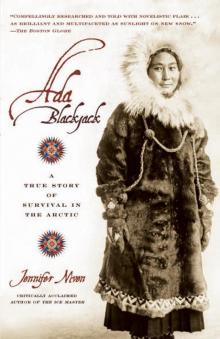 Ada Blackjack: A True Story of Survival in the Arctic
Ada Blackjack: A True Story of Survival in the Arctic The Aqua Net Diaries: Big Hair, Big Dreams, Small Town
The Aqua Net Diaries: Big Hair, Big Dreams, Small Town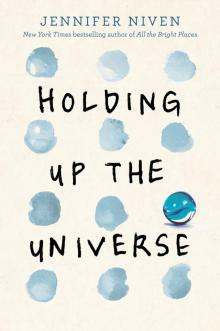 Holding Up the Universe
Holding Up the Universe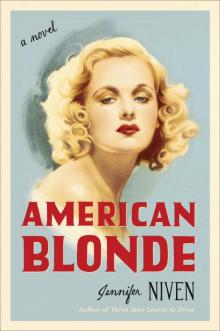 American Blonde
American Blonde All the Bright Places
All the Bright Places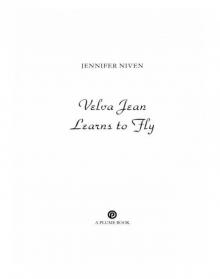 Velva Jean Learns to Fly
Velva Jean Learns to Fly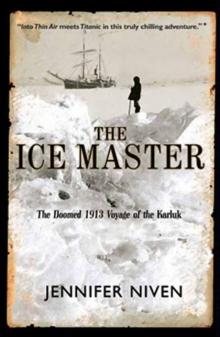 The Ice Master
The Ice Master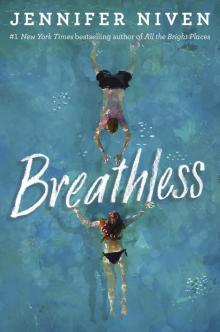 Breathless
Breathless The Aqua Net Diaries
The Aqua Net Diaries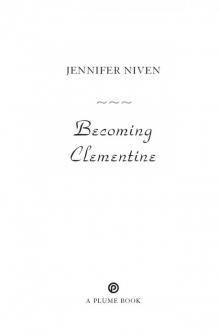 Becoming Clementine: A Novel
Becoming Clementine: A Novel